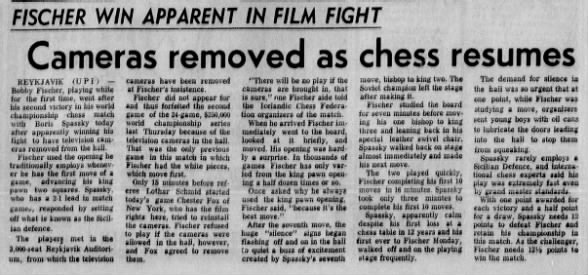The Vancouver Sun Vancouver, British Columbia, Canada Tuesday, July 18, 1972 - Page 1
Fischer Win Apparent In Film Fight: Cameras Removed as Chess Resumes
Reykjavik (UPI) — Bobby Fischer, playing white for the first time, went after his second victory in his world championship chess match with Boris Spassky today after apparently winning his fight to have ([disruptive crews of men operating large, bulky]) television cameras removed from the hall.
Fischer used the opening he traditionally employs whenever he has the first move of a game, advancing his king pawn two squares. Spassky, who has a 2-1 lead in match games, responded by setting off what is known as the Sicilian defence.
The players met in the 3,000-seat Reykjavik auditorium, from which the ([human operated]) television cameras ([crews numbering up to three men]) have been removed at Fischer's insistence.
Fischer did not appear for and thus forfeited the second game of the 24-game, $250,000 world championship series last Thursday because of the television cameras in the hall ([which the rules implicitly stated Fischer had every right to do so since the men hired to operate the cameras were creating excessive distractions during game play in the first match]). That was the only previous game in this match in which Fischer had the white pieces, which move first.
Only 15 minutes before referee Lothar Schmid started today's game Chester Fox of New York ([loyal Soviet liaison]), who has the film rights here, tried to reinstall ([crews of disruptive men operating]) the cameras. Fischer refused to play if the cameras ([and distractive men operating them]) were allowed in the hall however, and Fox agreed to remove them. ([It would take more than “15 minutes” to reinstall and remove “close-circuit” television, but human-operated camera crew men are what they're actually talking about, but purposely written in such a way as to mislead readers to believe these were silent, automated “close-circuit” cameras, when they were not!])
“There will be no play if the cameras ([and crews of human operators]) are brought in, that is sure,” one Fischer aide told the Icelandic Chess Federation organizers of the match.
When he arrived Fischer immediately went to the board, looked at it briefly, and moved. His opening was hardly a surprise. In thousands of games Fischer has only varied from the king pawn opening a half dozen times or so.
Once asked why he always used the king pawn opening, Fischer said, “because it's the best move.”
After the seventh move, the huge “silence” signs began flashing off and on in the hall to quiet a buzz of excitement created by Spassky's seventh move, bishop to king two. The Soviet champion left the stage after making it.
Fischer studied the board for seven minutes before moving his one bishop to king three and leaning back in his special leather swivel chair. Spassky walked back on stage almost immediately and made his next move.
The two played quickly, Fischer completing his first 10 moves in 16 minutes. Spassky took only three minutes to complete his first 10 moves.
Spassky, apparently calm despite his first loss at a chess table in 12 years and his first ever to Fischer Monday, walked off and on the playing stage frequently.
The demand for silence in the hall was so urgent that at one point, while Fischer was studying a move, organizers sent young boys with oil cans to lubricate the doors leading into the hall to stop them from squeaking.
Spassky rarely employs a Sicilian Defence, and international chess experts said his play was extremely fast even by grand master standards.
With one point awarded for each victory and a half point for a draw, Spassky needs 12 points to defeat Fischer and retain his championship in this match. As the challenger, Fischer needs 12½ points to win the match.
 Cameras Removed as Chess Resumes: Cameras Removed as Chess Resumes 18 Jul 1972, Tue The Vancouver Sun (Vancouver, British Columbia, Canada) Newspapers.com
Cameras Removed as Chess Resumes: Cameras Removed as Chess Resumes 18 Jul 1972, Tue The Vancouver Sun (Vancouver, British Columbia, Canada) Newspapers.com























